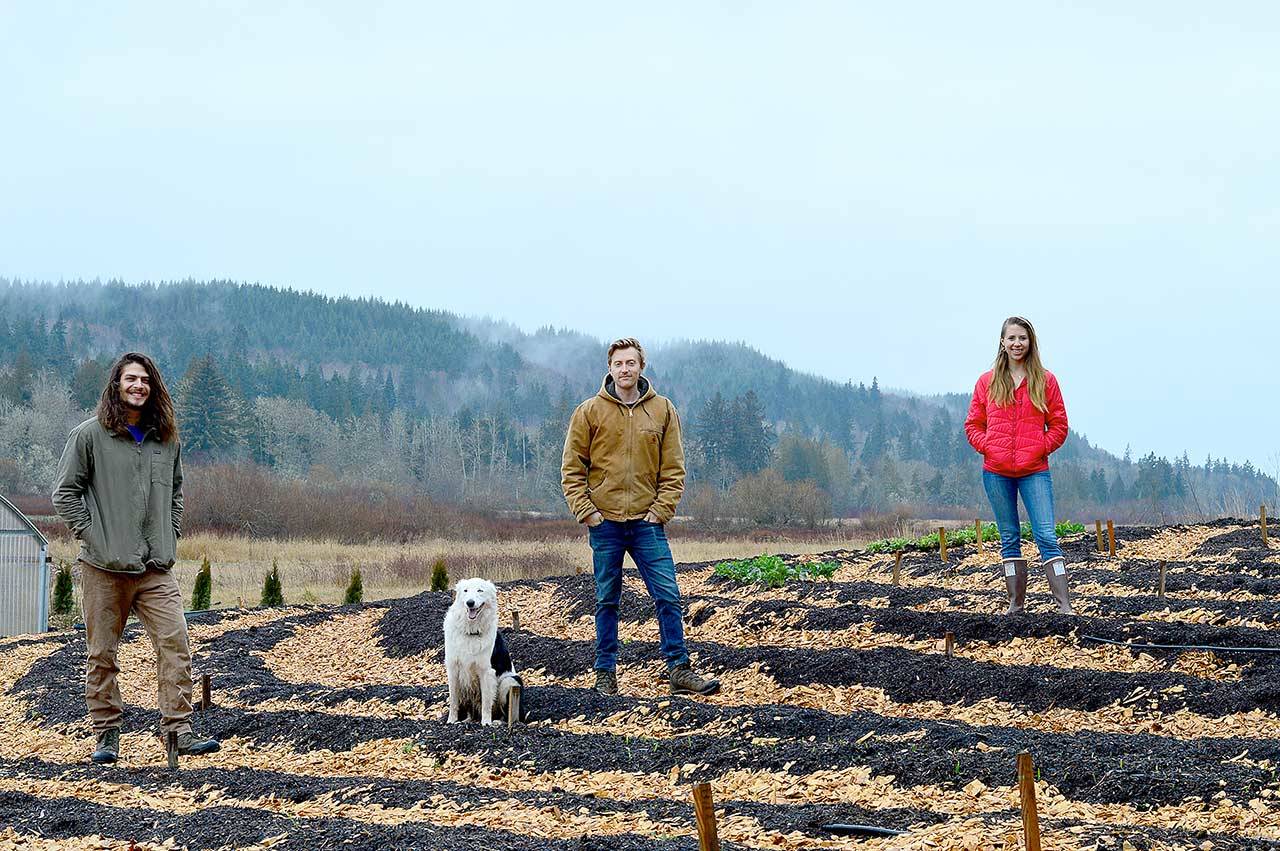CHIMACUM — Kodama, according to Japanese lore, are tree spirits. Both souls and guardians, they watch over the forest as it provides a home for creatures big and small.
This word was perfect, then, for three young farmers’ vision of a place where birds, salmon, humans, fruits and vegetables coexist: the Kodama Farm and Food Forest.
This nearly five-year-old operation on the appropriately named Tall Tree Lane has just become the site of a conservation easement purchased by the Jefferson Land Trust.
Owners Matt Montoya, Grace Thompson and her brother Ben Thompson are working 45 acres that will remain farmland and wildlife habitat in perpetuity, in light of the legal agreement requiring it to be so.
“This is our main vegetable plot,” Montoya said, standing beside a gently sloping expanse near the chickens’ pasture and the Nigerian dwarf goats’ pen.
“We grow every vegetable you can think of,” he added, from kale to corn to beans to peas to lettuces. Those hens provide eggs while the goats provide milk for soap made here; these products will be on sale in the farm stand May through October. And customers will have to move fast.
“There was a huge demand for eggs,” Montoya said of last year; “they sold out in minutes,” so Kodama doubled its flock in preparation for this coming spring.
When Montoya and Grace Thompson, both 28, and Ben Thompson, 30, arrived in Chimacum, they worked other jobs while obtaining the loan that would turn them into farmers in 2016. Their vision is realized: a regenerative farm, using no-till, organic practices alongside Chimacum Creek in Beaver Valley.
They also built a geodesic dome greenhouse — heated passively by thermal mass and a solar-powered “climate battery” — for growing tropical fruits.
Another greenhouse is planned, along with new housing for the farmers themselves.
Then there’s the food forest.
Kodama has a 5-acre orchard, cultivated to mimic a natural forest, rich nourishments and all. The high canopy is fruit trees; below are berry bushes, hazelnuts, kiwi fruit, alpine strawberries, herbs and edible mushrooms.
Eventually, Montoya explained, this grove will provide plentiful fresh food and nurture its soil at the same time.
In concert with the Jefferson Land Trust, the North Olympic Salmon Coalition (NOSC) is working with the Kodama farmers to restore 21 acres — nearly half their property — for Chimacum Creek salmon-rearing habitat.
NOSC, Washington State University and the Jefferson County Conservation District all partnered on this project, winning a Chimacum Watershed grant from the state Department of Ecology and the Environmental Protection Agency’s National Estuary Program.
“These projects can take years,” in this case nearly four, said Jefferson Land Trust Conservation Director Sarah Spaeth.
The Kodama farmers “stepped out on a limb to buy the land,” she added, before the grant and conservation easement process got going.
Walking across the land under a light rain Thursday morning, Montoya noted that, on some farms, a fence is built between the farmland and the riparian habitat.
At Kodama, the crew will instead plant a living hedgerow of edible crops.
Nearby, Chimacum Creek will be re-meandered so it follows a more natural path, creating improved rearing habitat for Puget Sound Coho salmon. Volunteers and Washington Conservation Corps workers will plant thousands of native plants to improve water quality. And one day, with NOSC and the Land Trust’s aid, the farmers plan to weave public walking trails through the conservation site.
All three of Kodama’s crew are from Boulder, Colo., while the Thompson siblings spent much of their youth in Seattle. Each had previous lives: Grace was headed for veterinary school and Ben for medical school while Montoya worked in his family’s wedding and events business.
Then they went on a hike together, and let themselves dream out loud. This dream involved farming, closeness with nature — and good food. Many months of copious research later, they relocated to the North Olympic Peninsula and a whole new life.
The trio is well aware of their position at the younger end of the farming spectrum. The average age of American farm operators is 57.5, according to the USDA’s 2017 Census of Agriculture. In this part of Washington state, that number is closer to 59.
Yet here in their biodiverse part of the valley, Kodama’s crew has found its place.
“It’s a renaissance of new agriculture,” Montoya said.
________
Jefferson County senior reporter Diane Urbani de la Paz can be reached at 360-417-3509 or durbanidelapaz@peninsuladailynews.com.

